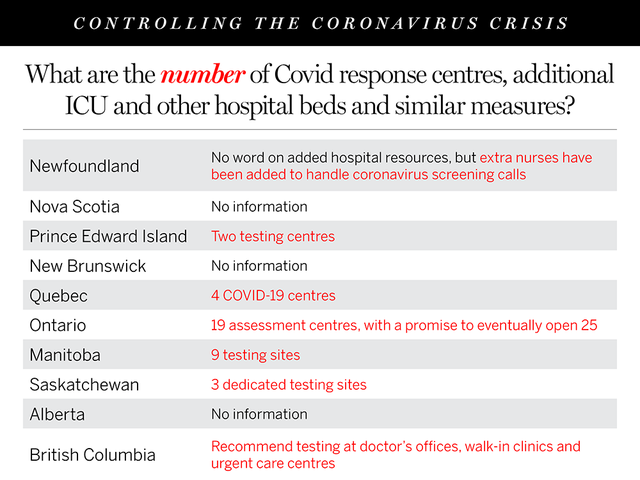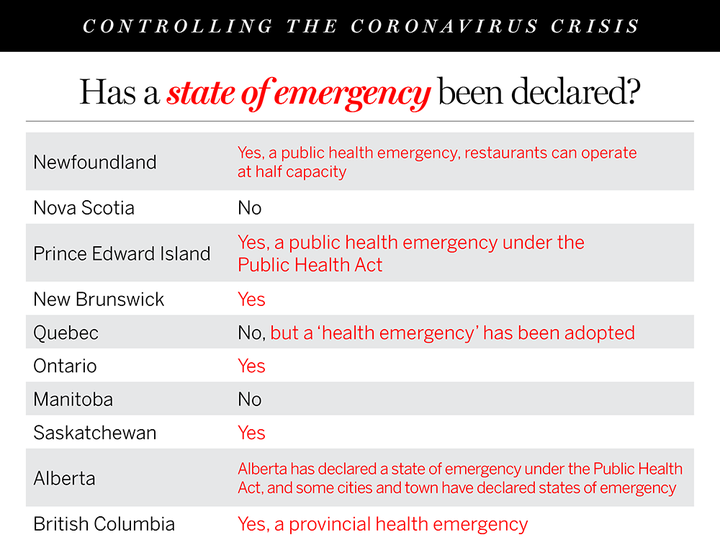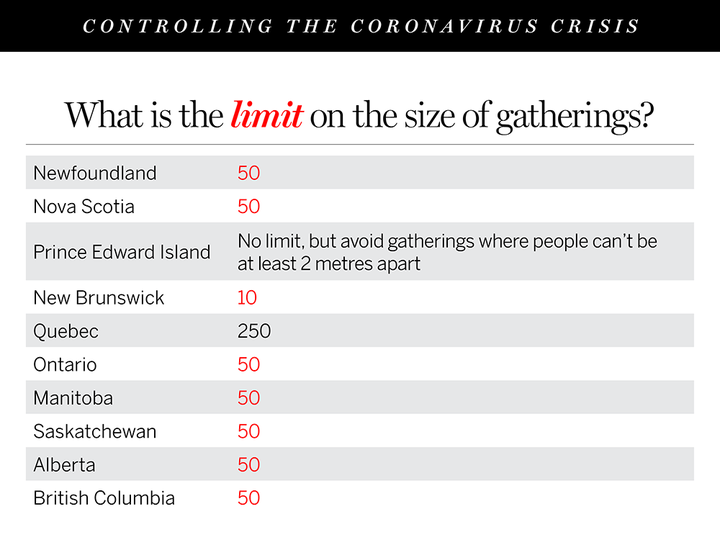as covid-19 crisis sweeps across canada, not every part of the country has reacted the same
unprecedented measures for unprecedented times for canadians, where literally tens of millions of citizens are being asked to step up
we apologize, but this video has failed to load.
try refreshing your browser, or
tap here to see other videos from our team.
tap here to see other videos from our team.
covid-19 will leave no canadian untouched.travel plans halted. first dates postponed. school semesters interrupted. jobs lost. retirement savings decimated. some of us will know someone who has gotten sick, or tragically, died from the virus.and all of this happened in a matter of weeks. with each passing day, hour, even, arrives a new study, new insight, new outbreak or new measure meant to counteract the crisis.by now we know the terminology: social distancing, flatten the curve. across the country, each province is taking measures to prepare, to plan for care, and the federal government has introduced financial measures amounting to more than three per cent of the country’s gdp to float the economy onward.the response, says steven taylor, a university of british columbia psychiatry professor and author of the psychology of pandemics, is a “balancing act.” keep people alert, but neither panicked nor tuned out.“you need to generate some degree of anxiety that gets people’s attention,” says taylor. “if you overstate the message it could backfire.”the crisis began slowly in canada.most of the early cases were travel-related, as canadians flew home from earlier-hit countries such as iran and china. the first crisis hit the lynn valley care centre, a long-term-care home in north vancouver, where a health-care worker tested positive for covid-19. since then, seven residents have died and several others, including staff, have fallen ill. governments across the country jerked into action; the federal government closed the border to most foreigners on monday, and by the weekend will even close it to our neighbour, the united states. no matter, there have been several instances of covid-19 spreading within canada.as of thursday morning, dr. theresa tam, canada’s chief public health officer, said there were 772 cases and nine deaths, countrywide. twenty minutes later, canada recorded its 10th: a man in his 50s died in oakville.in cities, the effects are obvious. bars and gyms in edmonton have signs up, explaining why they are closed, while shops have printed out government signs on their doors, saying, “open for business, and keeping albertans safe.” in ontario, restaurants and bars are shuttered or converted to dine-out operations.not everywhere in canada is responding the same. alberta has declared a state of public health emergency, as has quebec and pei.
governments across the country jerked into action; the federal government closed the border to most foreigners on monday, and by the weekend will even close it to our neighbour, the united states. no matter, there have been several instances of covid-19 spreading within canada.as of thursday morning, dr. theresa tam, canada’s chief public health officer, said there were 772 cases and nine deaths, countrywide. twenty minutes later, canada recorded its 10th: a man in his 50s died in oakville.in cities, the effects are obvious. bars and gyms in edmonton have signs up, explaining why they are closed, while shops have printed out government signs on their doors, saying, “open for business, and keeping albertans safe.” in ontario, restaurants and bars are shuttered or converted to dine-out operations.not everywhere in canada is responding the same. alberta has declared a state of public health emergency, as has quebec and pei.
 governments across the country jerked into action; the federal government closed the border to most foreigners on monday, and by the weekend will even close it to our neighbour, the united states. no matter, there have been several instances of covid-19 spreading within canada.as of thursday morning, dr. theresa tam, canada’s chief public health officer, said there were 772 cases and nine deaths, countrywide. twenty minutes later, canada recorded its 10th: a man in his 50s died in oakville.in cities, the effects are obvious. bars and gyms in edmonton have signs up, explaining why they are closed, while shops have printed out government signs on their doors, saying, “open for business, and keeping albertans safe.” in ontario, restaurants and bars are shuttered or converted to dine-out operations.not everywhere in canada is responding the same. alberta has declared a state of public health emergency, as has quebec and pei.
governments across the country jerked into action; the federal government closed the border to most foreigners on monday, and by the weekend will even close it to our neighbour, the united states. no matter, there have been several instances of covid-19 spreading within canada.as of thursday morning, dr. theresa tam, canada’s chief public health officer, said there were 772 cases and nine deaths, countrywide. twenty minutes later, canada recorded its 10th: a man in his 50s died in oakville.in cities, the effects are obvious. bars and gyms in edmonton have signs up, explaining why they are closed, while shops have printed out government signs on their doors, saying, “open for business, and keeping albertans safe.” in ontario, restaurants and bars are shuttered or converted to dine-out operations.not everywhere in canada is responding the same. alberta has declared a state of public health emergency, as has quebec and pei.
advertisement

ontario enacted a full-blown state of emergency on tuesday. when ontario premier doug ford, made the announcement, he stressed he did so on the advice of the province’s top doctor, david williams.“right now, we need to do everything we can to slow the spread of covid-19 in order to avoid overwhelming our healthcare system,” he said.in british columbia, which has more than 231 cases, public safety minister mike farnworth declared a state of emergency on wednesday. he also announced a ban on re-selling essential goods.saskatchewan also declared a state of emergency this week, and new brunswick is the latest province to go that route.in newfoundland and labrador, the government declared a public health emergency and limited gatherings to 50 people or less; restaurants may operate at half capacity.

the question now is how long this can go on .“social distancing is an enormously costly process, but if you’re going to do it, you’ve got to do it fast and early for it to be effective,” says taylor.on thursday, prime minister justin trudeau suggested social distancing could continue for “weeks or months.” indeed, his family is leading by example: sophie grégoire trudeau tested positive for covid-19, and the family is isolating.unprecedented measures for unprecedented times for canadians, where literally tens of millions of citizens are being asked to step up to protect their own, their families’ and their neighbours’ welfare.– with files from postmedia network and saltwire network• email: tdawson@postmedia.com | twitter: tylerrdawson
suscribe to our news podcast, 10/3, on apple podcasts
suscribe to our news podcast, 10/3, on apple podcasts
our website is the place for the latest breaking news, exclusive scoops, longreads and provocative commentary. please bookmark nationalpost.com and sign up for our newsletters here.
 3 minute read
3 minute read
